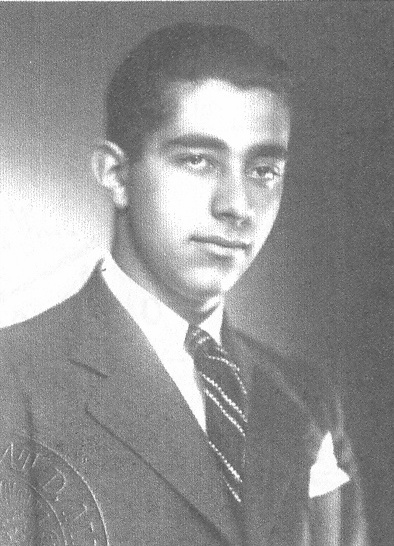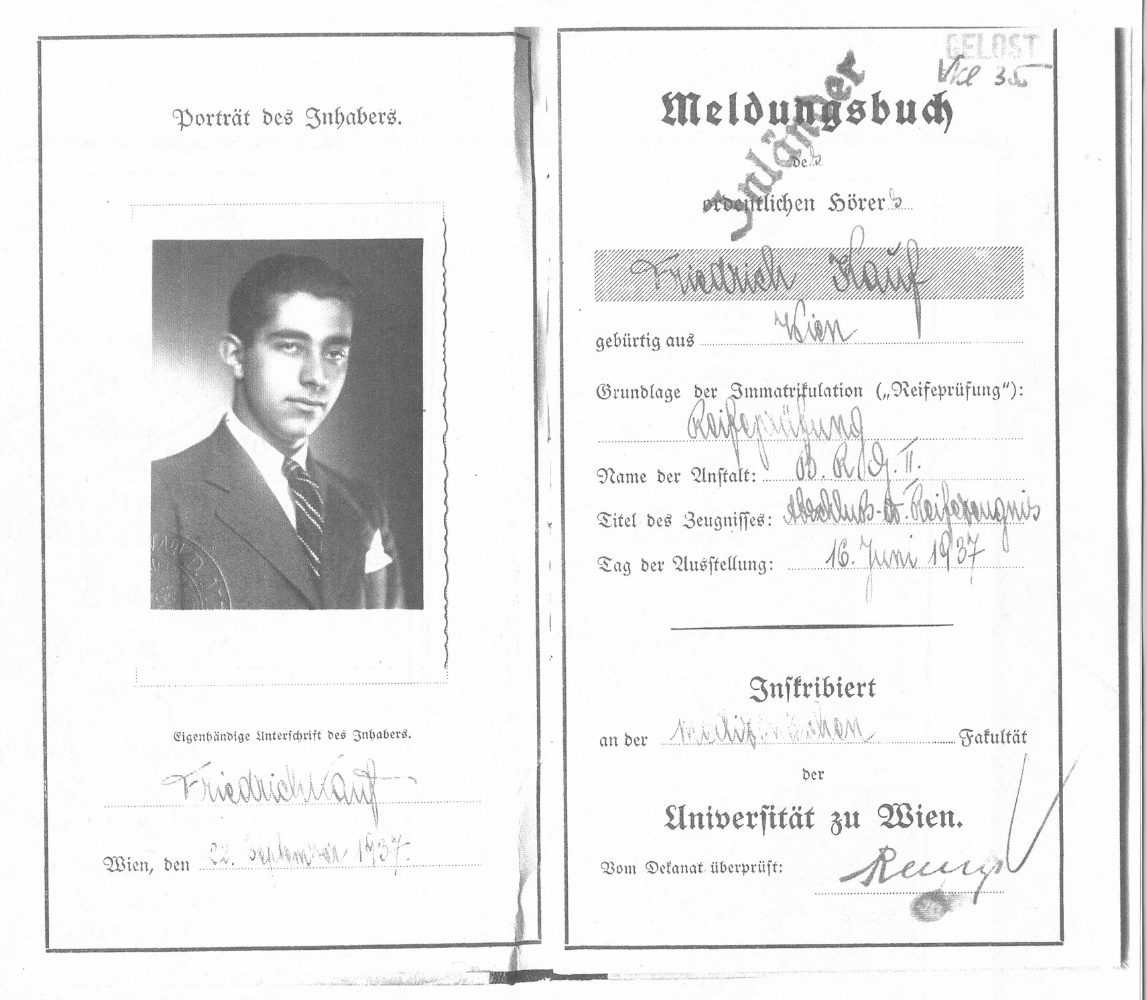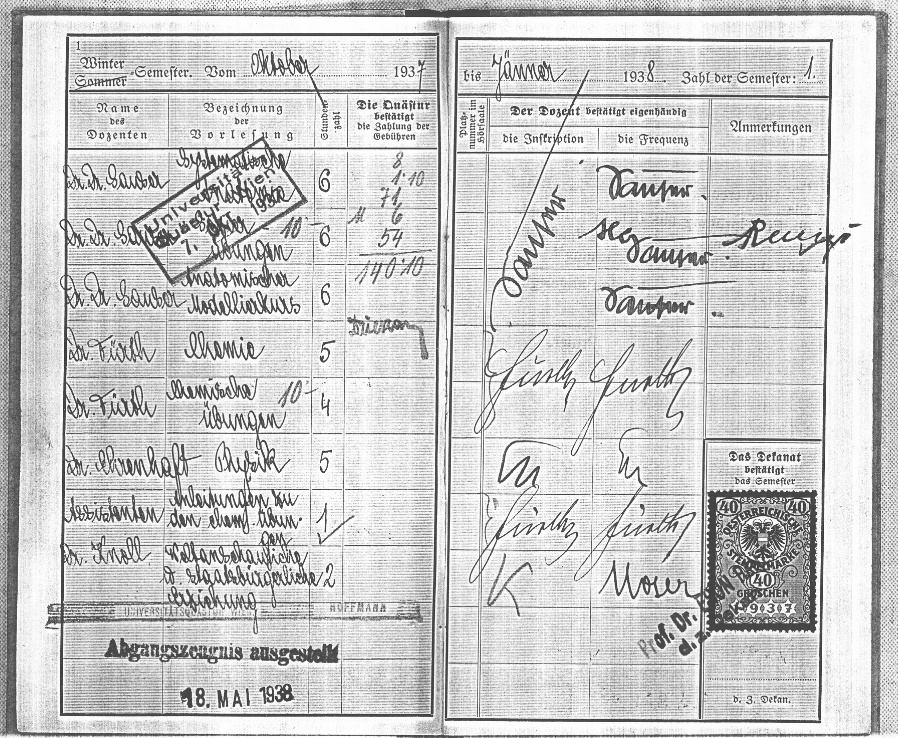
| Born: | 06-07-1919 |
| Faculty: | Medical School | Medical University Vienna |
| Category: | Expelled student |
Friedrich KAUF, born on June 7th, 1919 in Vienna/Austria (entitled residency ("heimatberechtigt") for Vienna/Austria, citizenship 1938: Austria), son of Hersch/Hermann Kauf (merchant, October 9, 1880 in Lemberg–July 26, 1939 in Vienna) and Johanna Kauf, née Steiner (January 25, 1882 in Vienna–October 9, 1943 in Auschwitz) and he lived with his parents in Vienna's 2nd district, Zirkusgasse 28/6. He had passed his school-leaving examination ("Matura") at the Bundesrealgymnasium in Vienna's 2nd district (Kleine Sperlgasse 2c) on June 16th, 1937 and then began to study medicine at the University of Vienna. He was last enrolled in the spring term 1938 at the Medical School in the 1st year of his studies.
In 1938, after the takeover of power of National-Socialism he was forced to quit his studies for racist reason and to leave the University of Vienna (Leaving certificate ("Abgangszeugnis") was issued on May 18th, 1938). His elder brother Siegmund Kauf (1917–1975), who studied at the Medical School, too, was also expelled from the University of Vienna.
His parents had both grown up in Vienna, his father was a master sun and umbrella maker who in 1912 became a dispatcher at the Gerngross department store on Mariahilfer Strasse, where he managed the umbrella department and later also the jewelry and toiletries department and where he initiated the “OT-Praxis” (“Okkasion Tiefparterre”), where goods from a particular department were sold at special prices every Friday. During the First World War, his father served in the Austro-Hungarian army. His mother was a housewife
As Friedrich Kauf recalled in 2003, he and his brother Siegmund lived a pleasant life, spending their vacations in Baden and Bad Vöslau, on Lake Wörthersee in Pörtschach and Velden, in Payerbach-Reichenau and on the Semmering. In 1934 and 1935, they traveled to Siofok on Lake Balaton in Hungary. They belonged to the WAC (Wiener Athletik Club), the Schwarz-Roten, where they played tennis, field field hockey, handball and athletics. They were ardent soccer fans and attended many selection matches on the Hohe Warte and in the stadium. The famous goalkeeper Rudi Hiden was a friend of the family and he still remembers the 5:0 victory of the Wunderteam against Scotland on the Hohe Warte.
They were brought up very strictly, with the emphasis on education. The parents instilled a social conscience in their sons and that they should never brag to less fortunate families.
His father had six siblings, his mother two brothers and there were numerous cousins who were much older than Friedrich and his brother. Two of them were already doctors, Dr. Jacques Kauf and the famous heart specialist, Privatdozent Dr. Emil Kauf (August 30, 1895–December 26, 1927), who died early of cancer, assistant to Professor Dr. Kaufmann at the cardiac ward, who was also responsible for founding the sports commission that subjected boxers, weightlifters and wrestlers to medical examinations before their competitions and wrote numerous publications on the heart, including the book “Herz und Sport” (together with Felix Deutsch, Vienna/Berlin 1924), which was translated into many languages. It was an important motivation for the young Friedrich Kauf to study medicine and become a doctor himself as he mentions 2003:
"Although I developed a love of history at the Gymnasium—the title of my Maturahausarbeit was 'Die Grundlegung des Modernen Staates in Österreich durch die Reformen des Aufgeklärten Absolutismus und ihre Nachwirkung bis 1867,' I never gave up my dream of becoming a doctor—until I was forced to.
My education began at the Volksschule in the Czerningasse in 1925. My brother started there two years earlier. After passing the Aufnahmsprüfung, we went to BRG II (Bundesrealgymnasium) at Kleine Sperlgasse 2c. I started there in 1929, two years after my brother. After graduating Matura in June 1936, my brother decided to study medicine and 'inscribed' at the University. When I followed him to the University a year later in 1937, I thought I was on my way to fulfilling my dream.
I would like to make note of an incident that remains etched in my memory. The Vorstand der 1. Anatomischen Lehrkanzlei der Unversität Wien, Professor Dr. Gustav Sauser (1899-1968) turned to me as he signed my Meldebuch and asked, 'Herr Kollege, sind Sie zu Dozent Kauf verwandt?' I answered proudly,' Jawohl Herr Professor, Dozent Kauf war mein Cousin.'
By the end of the second semester, my brother passed the examination in Physics by Professor Ehrenhaft with a mark of 'excellent.' He was scheduled to take the chemistry examination by Professor Fürth in the last week of March 1938.
By the end of the second semester, my brother passed the examination in Physics by Professor Dr. Felix Ehrenhaft (1879–1952) with a mark of 'excellent.' He was scheduled to take the chemistry examination by Professor Dr. Otto Fürth (1867–1938). [...]
I was studying for my examination in May 1938 in Physics by Professor Ehrenhaft when the Anschluss took place on Friday, March 12, 1938. My dream of becoming a doctor was shattered. Life for Jews changed completely. The lessons now became ones of how to survive, day to day, in an increasingly dangerous atmosphere where random arrests became the norm. The only alternative was to find a way to escape the horror.
Through different relatives, my brother and I got visas to immigrate to the United States.
I left Vienna on March 1st, 1939 [by train to Paris and via Le Havre by boat to London and he was able to emigrate to the USA via Southampton/Great Britain on the SS Ansonia] and arrived in New York on March 15th, 1939, with about $25.00 in my pocket. This was the Bordgeld that I was permitted to take out of Germany. Life in New York for a newly arrived German refugee was not easy. I was alone.
For the first time in my life, I had to find a job and support myself.
Two weeks after his arrival in New York on May 12th, 1939, my brother found a job as a clerk in a small department store on Long Island. I went to New Hampshire to take part in the National Youth Administration, the NYA, an organization created by the Roosevelt administration to teach young people a trade. I learned welding and flame cutting, skills that I later used working in a welding defense plant in Boston, Massachusetts. I joined the army in October 1942 and was sent to England in March 1943 to help set up an artillery recoil repair shop. I was transferred to G-2 (Military Intelligence) in September 1943. The following January I volunteered to be a combat intelligence officer for the 101st Airborn Division. I was in combat from the invasion of Normandy until the war ended on May 8 1945. In July 1945, I was transferred into Military Government, first in Weinheim an der Bergstrasse and then in Mannheim-Freudenheim. I returned to Boston in January 1946 and was granted terminal leave on February 14, 1946.
I moved to New York in April 1946 and that month began working in textile printing, an industry that I stayed in until retirement. From the beginning, I was very active in our union. When I retired in 1998, I was president of the New York-New Jersey Regional Joint Board of Unite (Union of Needleworkers, Industrial and Textile Employees, AFL-CIO, CLC)."
He had applied for U.S. citizenship in New Hampshire on December 7th, 1939, which he received in 1944. On June 29th, 1947, he married Celia Gray (born February 14th, 1921 Hamburg), who worked as a public school teacher in New York City, and lived with her and their two daughters, Joyce A. Kauf (1950, writer), and Laraine S. Kauf (1956, worked in financial services) in Brooklyn, NY. Both daughters were able to obtain a university degree.
While he and his brother managed to escape, their parents remained in Vienna. The father was stricken with thyroid cancer in the summer of 1936, was soon paralyzed from the waist down and was admitted to the Rothschild Hospital a few days after the brothers' departure from Vienna, where he died on July 26th, 1939. Although the sons tried to bring their mother to the USA from the USA and had even already bought passage on a Hamburg American Line ship, the attempt failed when transatlantic travel was restricted at the beginning of the war, whereupon they reserved a ticket on the Clipper from Lisbon to New York, but the U. S State Department took too long and mother Johanna Kauf was deported from Vienna to the Litzmannstadt/Lodz ghetto on November 12th, 1941 and from there to the Auschwitz concentration camp where she was murdered on October 9th, 1943, the day of her arrival.
Finally, Friedrich Kauf again in his letter to the research project “Expelled students at the University of Vienna” from 2003:
"Gentlemen, this is story of the Kauf family. My brother and I realized that only a miracle could give us the opportunity to continue our medical studies in the United States. We were not dreamers, but realists. Circumstances had spiraled out of our control. We devoted ourselves to making a good living in this country, to getting married and starting our own families. And, following the example set by our parents, we were determined to give our children a good education, the foundation for a prosperous life. Wir haben dies geschaffen.
In closing, I would like to say that I am and have always been proud of my life in Vienna — my parents of course, our relatives and my education. Unfortunately, the horrific events and actions that took place leave wounds that can never heal.
The first 20 years of my life are now mostly memories. I consider myself an American. I am proud to have worn the uniform of the American army. I thank God for His protection and guidance.
I said earlier that I had a love of history and I hope that my letter will contribute to the history that you are cataloging. Gentlemen, I wish you much luck with your project."
Friedrich Kauf died on January 23rd, 2008 in Brooklyn, NY/USA.
Lit.: Archive of the University of Vienna/enrollment forms ("Nationale") MED 1937–1938; POSCH/INGRISCH/DRESSEL 2008, 414; letter of Friedrich KAUF from May 14th, 2003; www.ancestry.de, www.familysearch.con, www.genteam.at, www.doew.at, www.arolsenarchives.org.
Herbert Posch

